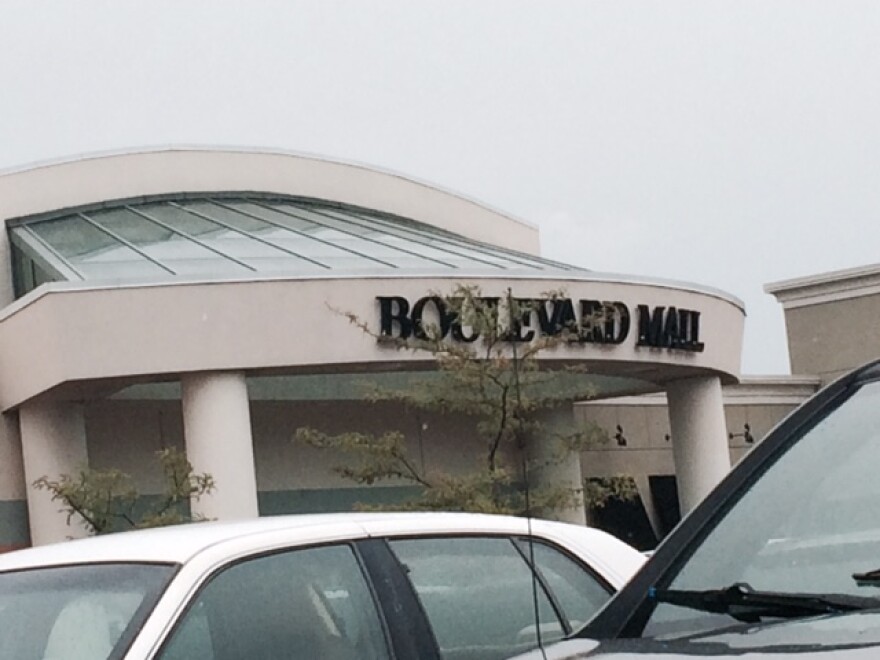This past July the nation celebrated the 25th anniversary ofAmericans with Disabilities Act. The civil rights law was designed to prevent discrimination against those with disabilities. A section of the law also works to make sure places are accessible. But one local woman brought her story to WBFO's Eileen Buckley, describing her life filled with 'inaccessibility'.
Challenges
"Even if I was in my power wheel chair -- I could not come alone," said Susan Skoney of Tonawanda.

It's a week day afternoon outside the Boulevard Mall in Amherst and Skoney of Tonawanda arrives in her wheelchair with her aid assisting to enter.
Skoney has Multiple Sclerosis and wanted to meet at the main entrance facing Niagara Falls Boulevard to demonstrate her difficulty at that particular entrance where there is no automatic door.
"There's a big juggling act that goes on -- trying to get a wheelchair in and it's not just one door, it's double doors," Skoney explained.
ADA, Title III
Under Title III of the ADA there are 'minimum standards' for accessibility. Businesses are required to make "reasonable modifications". But Skoney said in her daily experience, traveling to other retail shops, drug stores and even some medical offices, she struggles. She said she believes there is a segment of the population that is being under served.
"They can't worship, they can't shop, they can't get medical attention. I think a lot of people will just give up," stated Skoney.
Skoney questions why the mall doesn't have automatic door openers at all its exterior entrances. But it's not required.
"And the ADA never requires an automatic door. That's just not a requirement in the ADA nor the building code," said Jennifer Perry, Access Specialist, Northeast ADA Center. It serves New York, New Jersey, Puerto Rico and the U.S. Virgin Islands.
"But the ADA takes that a step further and says even if you operate a business in an older building, that was built pre-ADA, and you're not alterations you still have this obligation to do what is know as barrier removal, which means, in essences, you have an obligation to improve access for people with disabilities if it is readily achievable for you, as a business owner or facility owner, to do so,"stated Perry.

The Boulevard Mall opened in 1962 well before the ADA. The mall is operated by an out-of-town firm Forest City.
WBFO News reached the Mall's General Manager Brian Calvert, but the company would not allow him to conduct an interview. However, Calvert noted there is an automatic door at an entrance near TGIFriday's off the Boulevard. He also forwarded us the company's policy on the ADA.
Forest City’s Policy on ADA:
"It is the policy of Forest City Enterprises, Inc. (FCE) to comply with Title III of the Americans with Disabilities Act (ADA) and similar state laws with respect to its shopping centers and malls and other public accommodations. In instances where the Company is operating a public accommodation, the Company will make reasonable modifications in its policies, practices and procedures where such policies, practices and procedures may otherwise deny equal access to individuals with disabilities. For example, the Company will permit service animals to enter a location where pets normally would not be permitted. In addition, the Company will work to provide auxiliary aid and services where needed and where it does not present an undue burden to the public accommodation. Finally, the Company requires its tenants to comply with all applicable federal and state laws, including the ADA. It states it will make reasonable modifications in its policies, practices and procedures where it may deny equal access to individuals with disabilities. The mall noted that it does provides wheelchair service."
The mall noted that it does provides wheelchair service. ADA's Jennifer Perry said as long as it follows the requirements for accessibility are in place 'it is in compliance.'
Still, Skoney's is not pleased with the ADA. She referred to it a 'joke'. "It is so loosely written in some respects and in some, it is very straight forward," Skoney responded.
Advocacy
"This is something we deal with quite a bit and what I'm going to do is I"m going to applaud the listener for advocating for the things she actually wants," Todd Vaarwerk, Director of Advocacy and Public Policy at the Western New York Independent Living Center in Buffalo.

"Yes, in terms of researching this and pointing it out, we found out that the power assist door is at another location, a different one then she enters in, but advocating for something that you want is a critical component of getting the community more accessible," said Vaarwerk.
For many years Independent Living Center provides a voice for people with disabilities and works to enhance their quality of life. Vaarwerk is also a wheelchair user and has Cerebral palsy, so he completely understands Skoney's struggles.
"Do I struggle -- absolutely. Last winter was a bear and a half!," stated Vaarwerk.
And because Buffalo is an older city there are always challenges in making change. "We've been really good at making sure that the new stuff we are building is accessible from the word go, but as what happened with your listener, you're looking for something that isn't actually required by the ADA, however, we're talking to people about universally designing the community," said Vaarwerk.
"You tend to be ignored because you are not at eye-level with the rest of the adult populations," said Skoney as she sat inside the mall.

When you listen to Skoney's story, it highlights the constant need to redevelop for accessibility.
"Does being an invalid make you invalid, and there is almost an invalidation of one's person when you are in a wheelchair," Skoney said.



